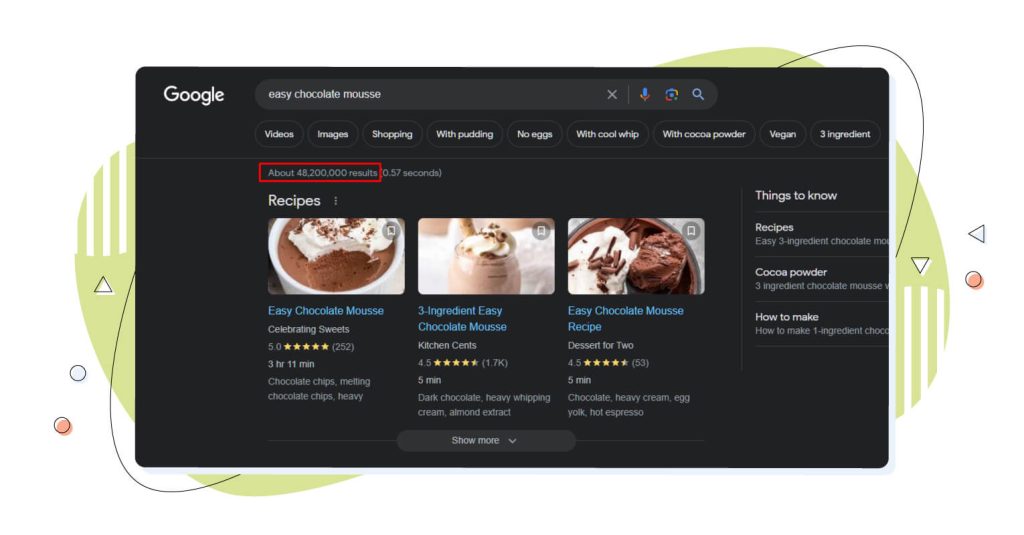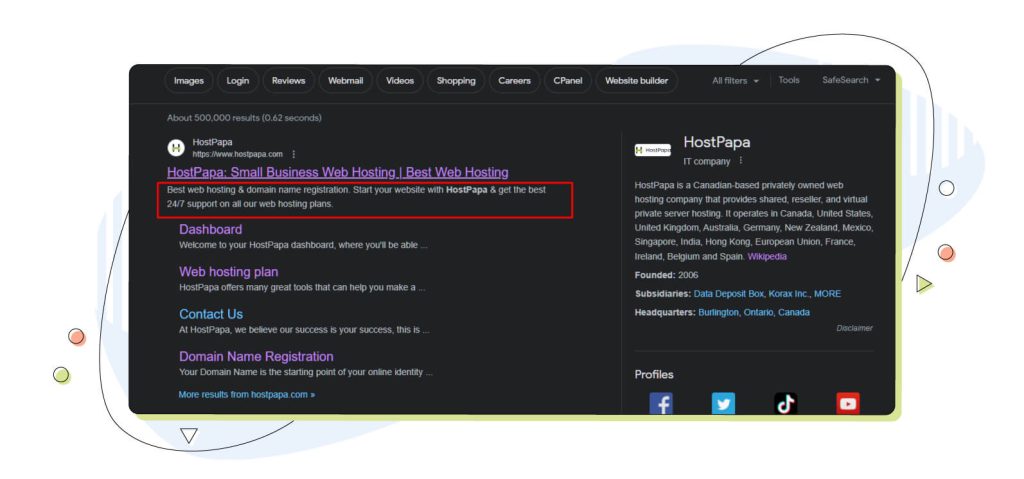At the heart of every successful blog lies a well-thought-out keyword strategy.
By incorporating relevant keywords in your blog post, you can effectively target your intended audience and increase the visibility of your content in search results related to your topic.
This HostPapa blog is a short guide to help you learn the basics and best practices for precise keyword research for your blog posts, ensuring they rank well on Google and other search engines.
So, let’s dive in.
- Let’s Explain: What is Keyword Research, and Why Is It Important?
- How Search Engines Use Keywords to Rank Content
- Step-by-Step Guide to Keyword Research
- How to Target Specific Keywords On Your Blogs
Let’s Explain: What is Keyword Research, and Why Is It Important?
The world of search engine optimization (SEO) is full of tech jargon and sometimes difficult-to-understand wording, but its importance for ranking higher on Google is unparalleled.
Keyword research is the process of identifying and selecting words or phrases that people are likely to use when searching for information online.
It helps you understand what your target audience is looking for and enables you to optimize your content to match those search queries.
Imagine searching for a recipe online and typing something like “easy chocolate mousse” into a search engine. The words “easy chocolate mousse” are the keywords.
Now, think about how many people around the world might be typing those exact words every day. This amount is usually displayed as the search volume (or monthly search volume), depending on the keyword research tool you’ll end up using.

On Google, the total number of related results is visible just under the search form.
How Search Engines Use Keywords to Rank Content
The internet is like an enormous library, and search engines like Google are the super-smart librarians making sure every bit of information is logged in.
When people type questions into Google, these search engines use keywords to find and organize all the information.
So, if your blog has the right keywords, it’s like having your book at the top of the library shelf – easy for people to find! For website owners, a good way of checking out how your site’s doing is to set up your Google Search Console and start scraping your site’s content. We’ve written a comprehensive article to learn how to use Google Search Console.
Importance of Targeting the Right Keywords for Your Audience
If you’re a dealership selling motorcycles in Italy, you want your messaging to be related to bike enthusiasts living in the country so you can entice them to visit your company’s website or a physical store.
By targeting specific keywords such as “motorcycles in Italy,” you can increase visibility for your business within your desired audience or market.
By focusing on the topics people are searching for online, you can increase the chances of visitors purchasing or expressing interest in learning more about your offerings.
So, in short, the whole keyword research process is vital for the following reasons:
- It seamlessly connects with your audience
- You stand out from your competitors
- Your visibility is boosted, especially in local markets
- It helps climb up the search engine rankings
Step-by-Step Guide to Keyword Research
Everything starts with an idea or a topic you wish to explore.
What would your audience want to read, and how can your business help them?
Businesses and eCommerce store owners can choose their best-selling product category and create a blog post with that or a social media post.

1. Analyze Competitors and Use Keyword Tools
Next, it’s time for action.
To gain insight into your competitors’ marketing strategies, browse their social media pages and blogs and make a note of what they’re doing.
Use tools like SEMrush, Ahrefs, or Google Keyword Planner to analyze keywords people use to search for your product.
Remember the motorcycle dealership example from Italy?
Look up the number of hits for “Motorcycle in Italy” and use this information to create content that will appear in these search results and generate traffic for your business.
2. Long-Tail Keywords: Why They Matter and How to Find Them
When thinking about your topics, it’s essential to consider specific details related to them.
This includes asking questions such as who is involved, what happened, where did it occur, when did it take place, and why did it happen.
By considering these details, you can gain a deeper understanding of your topic and be more informed when discussing or writing about it.
Formulate longer phrases or questions that people might use in searches.
To attract a more focused audience that is specifically interested in what you have to offer, it can be beneficial to use longer and more specific keywords, also known as long-tail keywords.
In our technical article on keyword research and SEO, we discussed this topic in greater detail.
3. Intent-Based Keywords: Aligning Content with User Search Intent
Perhaps the most important aspect in making your keyword strategy is to find out why people are searching for information related to your topics.
To maximize the impact of your keyword strategy, it’s crucial to understand the motivations behind people’s searches for information on your subjects.
Align your content with the user’s intent. Whether it’s to learn, buy, or find a solution. Craft your keywords to match the searcher’s purpose, ensuring your content fulfills their needs.
How to Target Specific Keywords On Your Blogs
With everything we discussed in our sections above, it’s time to start integrating the keywords into your content.
Whether it’s a blog on an eCommerce site or a company website, the procedure remains the same, and the need for keyword research becomes equally important.
1. Naturally Integrate Keywords in Your Content
Imagine your keywords as road signs on the journey through your blog. Sprinkle them naturally in your content, especially in titles, headings, and the first few sentences.
This way, when your readers cruise through, they’ll immediately know they’re on the right track.
2. Create Compelling Meta Descriptions
Think of meta descriptions as your blog’s trailer – a sneak peek that invites people to click. Enticing meta descriptions will help increase your traffic, according to statistics. Meta descriptions aren’t a ranking factor, as Google’s John Mueller notes.

Other studies have shown that 25% of the internet’s top-ranking web pages don’t have meta descriptions (because they don’t need them). But certainly, enticing users on what they’ll expect from your website is recommended.
Include your keywords here to give a clear preview of the exciting content awaiting them. It’s like telling them, “Here’s what you’ll discover on this awesome ride!”
3. Craft Attention-Grabbing Headlines
Your headlines are like billboards on the highway. Use your keywords creatively to make them catchy and irresistible.
Whether it’s “Unveiling the Best Italian Bikes” or “Ride Into Adventure: Custom Motorcycle Deals,” make sure your headlines make heads turn.
4. (Use and) Optimize Your Images
Don’t forget to give your images a keyword makeover, too! HostPapa has a great in-depth guide on optimizing your images on WordPress, the most popular free-to-use CMS platform.
A few tips include renaming your image files using relevant keywords and adding alt text that describes the image with a touch of your awesome keywords.
It’s like giving your visuals a language that search engines understand.
5. Link Your Way to SEO Success
After you’ve created lots of content, start inserting internal links. These are like road signs pointing to other cool spots in your blog.
Link relevant keywords to other related blog posts or pages on your site. It not only helps with SEO but also keeps your readers exploring more of what you offer.
Another tip from HostPapa would be to start using backlinks, too. Backlinks are links between websites. They’re also called inbound links or incoming links
6. Regularly Update Your Content
Keep the engine of your blog running smoothly by updating your content regularly.
Add new keywords if you discover fresh ones, and refresh existing content to stay relevant in the fast-paced world of online searches.
Implementing your keywords is like taking your blog on a thrilling ride, ensuring it’s easily discovered by those eagerly searching for what you have to offer. Simple steps, big impact –
that’s keyword magic at work!
7. Use Your Social Media For Maximum Effect
Think of social media as the centre of your online community. Share your blog posts on platforms like Facebook, Instagram, and X.
Use captivating captions with your keywords to drive organic traffic. It’s like inviting the whole town to check out your excellent content.
Encourage readers to share their thoughts and experiences in the comments section. Respond to comments and create a conversation.
This engagement boosts your SEO and makes your blog a lively, dynamic space people love visiting.
Bonus: Web Hosting’s Role
In conclusion, it’s crucial to talk about the web host your website uses.
Having a reliable and top-notch web hosting plan is essential to ensure the success of your website’s keyword research and SEO strategy.
For simple WordPress websites, HostPapa’s Optimized WordPress will help you get started in a matter of minutes, and it’ll cost you just as much as a shared hosting plan would – so you’re saving precious time and money in the process.
SEO experts have emphasized the importance of having a fast-loading website, which HostPapa has also discussed extensively. Even if your keyword research is top-notch, a slow website can cause you to lose positions on search results pages.
Seeing these recommendations go live on top of your keyword research methods will help boost impressions and clicks through your website.
Finding keyword ideas that align with your audience, choosing results with generally low to mid keyword difficulty and optimizing your website according to all the best practices is the key to success.
Are you in need of a great domain name? HostPapa’s vast selection of domains has you covered for any time of the day! Your online journey starts with a great name!
For more interesting topics like this, head to our HostPapa blog.




